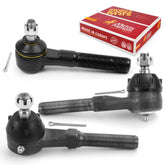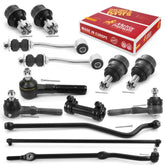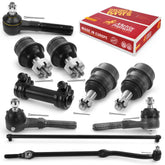How Driverless Cars are Reshaping the Future of Steering and Suspension

The advent of driverless cars has opened up a whole new world of possibilities for the automotive industry, transforming it in ways that were once thought impossible. One of the most significant areas of change has been the design and engineering of steering and suspension systems. In this blog post, we will discuss the evolution of these parts, from traditional to state-of-the-art technologies, and analyze how driverless cars are revolutionizing the future of automotive engineering, design, and functionality. We will also explore the potential benefits of these advancements, including improved safety, reduced maintenance costs, and enhanced driving experiences.
Evolution of Steering and Suspension Systems:
Traditional Systems:
In traditional vehicles, the steering and suspension systems were made up of mechanical components such as steering columns, tie rods, and shock absorbers. While these systems offered enough control and comfort, they had limitations in terms of their responsiveness and adaptability to different road conditions. For instance, the mechanical systems were not able to adjust to road bumps and dips quickly, which sometimes resulted in a bumpy ride. Over time, advancements in technology have introduced new steering and suspension systems that use electronic and computer-controlled components. These systems are designed to provide a more comfortable, responsive, and safe driving experience. For example, electronic steering systems are more precise and can adjust to changing driving conditions, making the ride smoother and more comfortable. Similarly, computer-controlled suspension systems can adapt to different road conditions and driving styles, providing a more stable and safer ride.
Advanced Technologies:
The introduction of advanced technologies, such as electric power steering (EPS) and adaptive suspension systems, has been a significant milestone in the field of automotive engineering. EPS systems have replaced conventional hydraulic systems with electrically-assisted steering, leading to improved fuel efficiency and enhanced control. The electric motor in EPS systems is powered by the vehicle's battery, which means that there is no need for a hydraulic pump, resulting in a more compact and lightweight steering system. Additionally, adaptive suspension systems use advanced sensors to monitor the road surface, speed, and direction of the vehicle, and adjust the suspension accordingly, resulting in a smoother and more comfortable ride. These technologies have transformed the way we drive and have made our cars more efficient, safe, and enjoyable to drive.
Driver Assistance Systems:As automotive technology advances, modern vehicles are equipped with more advanced driver assistance systems that offer a wide range of features designed to improve safety and convenience for drivers. Among these features are lane-keeping assist and adaptive cruise control which utilize steering and suspension inputs to provide a more comfortable and safer driving experience. By integrating steering and suspension with other vehicle systems, such as sensors and cameras, these features are able to make more precise calculations and adjustments to the vehicle's movements, helping drivers to stay within their lane and avoid potential collisions. As a result, these technologies are becoming increasingly important in the automotive industry and are expected to continue evolving in the coming years.
Autonomous Driving:
With the development of autonomous driving technology, the automotive industry is witnessing a pattern shift in the design and functionality of steering and suspension systems. Driverless cars rely heavily on advanced sensors, actuators, and control algorithms to navigate roads autonomously. This requires the integration of highly precise and responsive steering and suspension components to ensure a smooth and safe driving experience. The new systems are designed to provide optimum performance and stability while also minimizing energy consumption. With these advancements, the future of driving is sure to be more efficient, comfortable, and safer than ever before.
Aftermarket Steering and Suspension Parts
Metrix Premium Chassis Parts is a company that is committed to providing high-quality aftermarket steering and suspension components for modern vehicles. With the advancements in automotive technology, Metrix Premium Chassis Parts is at the forefront of the industry, offering precision-engineered parts manufactured with cutting-edge materials. These components are designed to meet the demands of modern vehicles, including adapting to the challenges of autonomous driving.
Metrix Premium Chassis Parts' products are known for their high performance, durability, and reliability. These parts are engineered to offer the perfect fit for your automotive needs, providing a smooth and safe ride. Whether you are looking to enhance the driving experience in traditional vehicles or adapt to the advancements of autonomous driving, Metrix Premium Chassis Parts has got you covered.
So, if you are looking for premium steering and suspension components for your vehicle, consider Metrix Premium Chassis Parts. Their products are designed to deliver exceptional performance, reliability, and durability, ensuring that your vehicle runs smoothly and safely for years to come.
In conclusion, the evolution of steering and suspension systems reflects the ongoing advancements in automotive technology, with driverless cars leading the way towards a future of safer, more efficient, and more comfortable transportation. With Metrix Premium Steering and Suspension Parts, you can be confident in embracing these advancements and experiencing the best of automotive innovation.
Join us on Instagram For More Tips!
https://www.instagram.com/metrixpremiumchassisparts/









